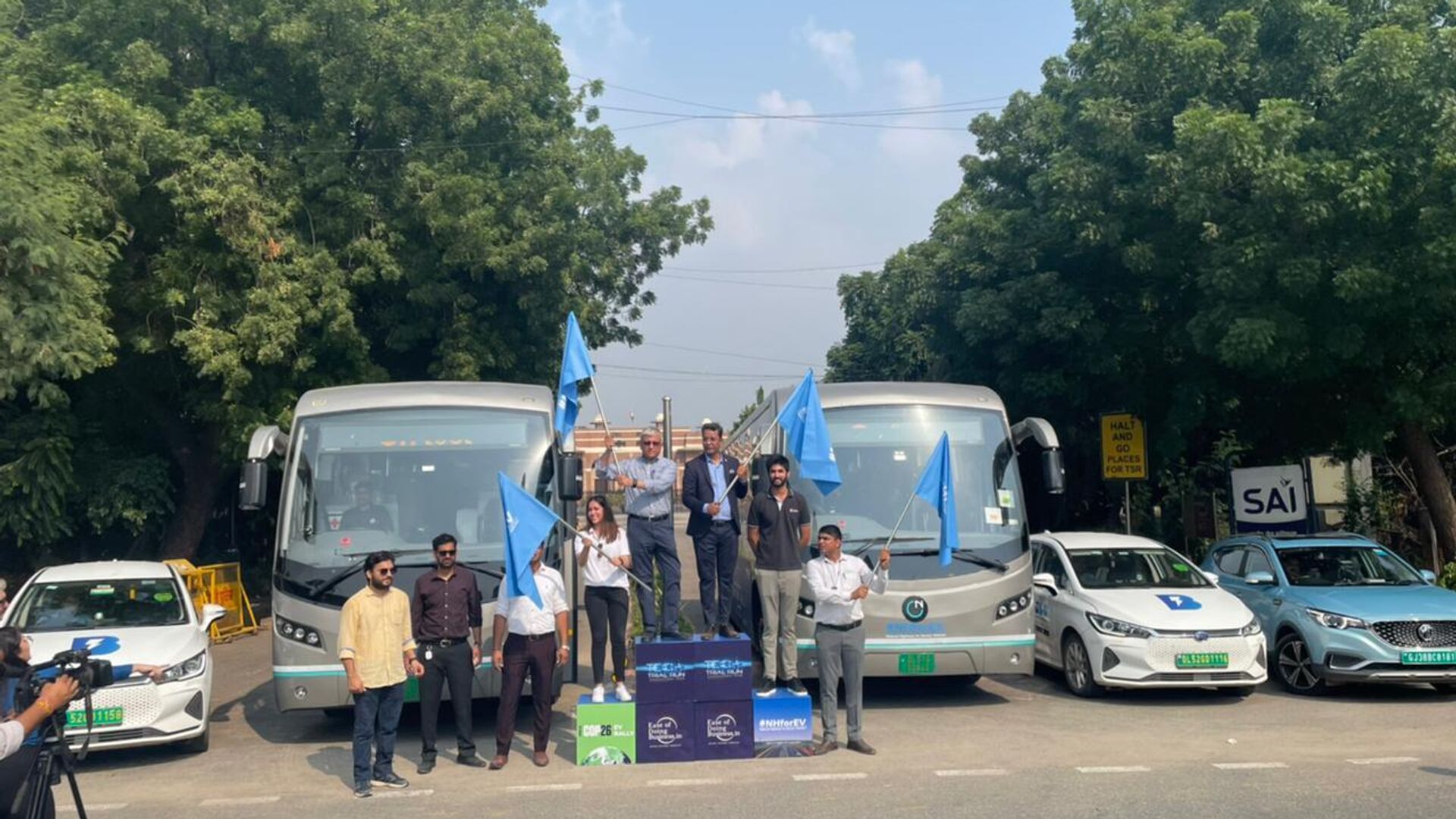https://sputnikglobe.com/20220909/on-world-ev-day-longest-tech-trial-run-of-electric-vehicles-launched-in-delhi-india-1100605652.html
On World EV Day, Longest Tech Trial Run of Electric Vehicles Launched in Delhi, India
On World EV Day, Longest Tech Trial Run of Electric Vehicles Launched in Delhi, India
Sputnik International
The first tech trial run of electric vehicles in India was conducted by the National Highway for Electric Vehicles (NHEV) in 2020 on the Delhi-Agra highway... 09.09.2022, Sputnik International
2022-09-09T17:57+0000
2022-09-09T17:57+0000
2022-09-09T17:57+0000
india
electric car
electric vehicles
electric vehicles
electric cars
electric bus
electric car charging
delhi
new delhi
rajasthan
https://cdn1.img.sputnikglobe.com/img/07e6/09/09/1100610503_0:119:1280:839_1920x0_80_0_0_018e06cc4b0b9dac0574ada8eac980ca.jpg
On the occasion of World Electric Vehicle (EV) Day, the longest tech trial run of electric vehicles was conducted in India by the National Highway for Electric Vehicles (NHEV) under the Ease of Doing Business (EODB) project.A fleet of two electric buses and four electric cars, all of which were a part of the tech trial run, was flagged off by Abhijeet Sinha, program director, NHEV, from India Gate in Delhi to Albert Hall Museum in Jaipur in Rajasthan.The fleet of electric vehicles covered 278 km on the Delhi-Jaipur highway.The tech trial run is being conducted by the National Highway for Electric Vehicles (NHEV) under the Ease of Doing Business (EoDB) project on the Delhi-Jaipur Expressway. The trial run will continue for one month.The objective of the trial is to understand the economic feasibility of the EV infrastructure along the highway.The first phase of the tech trial was conducted by the NHEV last year between Delhi and Agra on the Yamuna Expressway to analyze the technical feasibility of the EV infrastructure on the highway. In the second phase of the trial, the NHEV will also look to analyze the costs per seat of a person traveling in an electric bus, the per-day cost of renting an electric car, the upgrade cost of one kilometer of highway, and the CO2 emissions saved by one EV in a year.There will be 18 charging stations, 272 battery charging points, and two solar-powered stations on the Delhi-Jaipur highway.After the month-long tech trial run, the NHEV will present a detailed report containing findings and recommendations to Minister of Road Transport and Highways Nitin Gadkari.The findings and experiences from these tech trial runs will be utilized to convert 5,000 km of traditional highways into E-highways.
delhi
new delhi
rajasthan
jaipur
Sputnik International
feedback@sputniknews.com
+74956456601
MIA „Rosiya Segodnya“
2022
Rahul Trivedi
https://cdn1.img.sputnikglobe.com/img/07e5/05/12/1082926121_0:-1:627:627_100x100_80_0_0_d882e1a63f627c25b7a534fb8b8234d7.jpg
Rahul Trivedi
https://cdn1.img.sputnikglobe.com/img/07e5/05/12/1082926121_0:-1:627:627_100x100_80_0_0_d882e1a63f627c25b7a534fb8b8234d7.jpg
News
en_EN
Sputnik International
feedback@sputniknews.com
+74956456601
MIA „Rosiya Segodnya“
Sputnik International
feedback@sputniknews.com
+74956456601
MIA „Rosiya Segodnya“
Rahul Trivedi
https://cdn1.img.sputnikglobe.com/img/07e5/05/12/1082926121_0:-1:627:627_100x100_80_0_0_d882e1a63f627c25b7a534fb8b8234d7.jpg
india, electric car, electric vehicles, electric vehicles, electric cars, electric bus, electric car charging, delhi, new delhi, rajasthan, jaipur
india, electric car, electric vehicles, electric vehicles, electric cars, electric bus, electric car charging, delhi, new delhi, rajasthan, jaipur
On World EV Day, Longest Tech Trial Run of Electric Vehicles Launched in Delhi, India
The first tech trial run of electric vehicles in India was conducted by the National Highway for Electric Vehicles (NHEV) in 2020 on the Delhi-Agra highway. The electric vehicles covered a distance of 210 km.
On the occasion of World Electric Vehicle (EV) Day, the longest tech trial run of electric vehicles was conducted in India by the National Highway for Electric Vehicles (NHEV) under the Ease of Doing Business (EODB) project.
A fleet of two electric buses and four electric cars, all of which were a part of the tech trial run, was flagged off by
Abhijeet Sinha, program director, NHEV, from India Gate in Delhi to Albert Hall Museum in Jaipur in Rajasthan.
The fleet of electric vehicles covered 278 km on the Delhi-Jaipur highway.
The tech trial run is being conducted by the National Highway for Electric Vehicles (NHEV) under the Ease of Doing Business (EoDB) project on the Delhi-Jaipur Expressway. The trial run will continue for one month.
The objective of the trial is to understand the economic feasibility of the EV infrastructure along the highway.
Talking about the tech trial, Abhijeet Sinha told Sputnik: “This is the second phase of the trial run which will facilitate Indian Highways to be transformed into EV-highways while testing both technical and commercial aspects over a span of 500 km to the satisfaction of the entire spectrum of all stakeholders, which include users, operators, investors and government.”
The first phase of the tech trial was conducted by the NHEV last year between Delhi and Agra on the Yamuna Expressway to analyze the technical feasibility of the
EV infrastructure on the highway.
In the second phase of the trial, the NHEV will also look to analyze the costs per seat of a person traveling in an electric bus, the per-day cost of renting an electric car, the upgrade cost of one kilometer of highway, and the CO2 emissions saved by one EV in a year.
“Apart from several other factors, we will also analyze other factors like the requirement of a number of physical infrastructures and charging stations to support EVs efficiently, and other associated requirements for safe inter-state EV transportation will also be studied during the trial run. We aim to develop not only an E-highways network, but also a people-friendly network of 5,000 km by 2024,” Sinha further stated.
There will be 18
charging stations, 272 battery charging points, and two solar-powered stations on the Delhi-Jaipur highway.
After the month-long tech trial run, the NHEV will present a detailed report containing findings and recommendations to Minister of Road Transport and Highways Nitin Gadkari.
The findings and experiences from these tech trial runs will be utilized to convert 5,000 km of traditional highways into E-highways.




